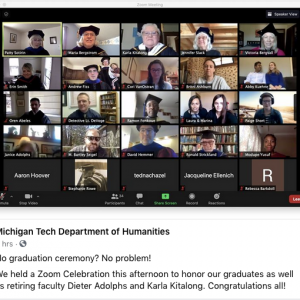I managed to snag this internship at the Portage Lake District Library after talking to its director and Tech alum, Dillon Geshel, at a pre-career fair networking event last spring. I ended up talking to Dillon about an idea he’d mentioned toying with in the past: making a podcast. After playing with ideas for a while, we settled on a very broad “Keweenaw history and culture” topic.
My time at PLDL was very hard to describe. The nature of my project didn’t require me to have regular working hours, but I still had to put in quite a bit of time to get things done. I spent the first few weeks working in the library and the Tech archives trying to find topics and then write the first episode, a twenty-minute set of short stories about shipwrecks.
When making the podcast, I had to dig up every bit of sound design knowledge I was taught in the two VPA classes I’ve taken. I wouldn’t have been able to make a professional piece without them. Dillon gave me frequent feedback on what I’d been doing and was very positive about the whole thing; he seemed excited to have someone who could handle the technical aspects of podcasting.
Having a background in STC wasn’t really essential for this internship, but it did make the initial stages much easier. Because of the heavy emphasis on personal communication early on in the STC program, I was relaxed at the networking event and my first few days of work. My early classes affirmed my confidence and let me start my work without too much stress.
I would definitely recommend seeking out this internship. It was heavily focused on my own growth as a professional, which really showed how genuine the program was. You can tailor it to pretty much any humanities endeavor, and Dillon is always open to new ideas.
—Liam Andersen, STC

